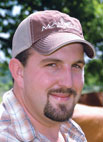
“It’s all about Cody,” is the philosophy Brian and Melissa Jacobs use on their Hawk Shadow Farms, located on the Wright-Douglas county line. Cody is Brian and Melissa’s 4-year-old son and they are evolving their goat and cattle operation to meet his interests and safety. For example, Cody attended his first goat shows this year at the Ozark Empire and Missouri State Fairs. Melissa said that since Cody showed an interest in showing goats, they plan to cut back on their commercial herd and purchase more full-bloods.
Melissa said there are several reasons they keep both commercial and full-blood Boer goats. “We try to keep a little bit of both because there are people who don’t want to spend thousands of dollars on full-blood Boers, but they’ll spend a couple hundred bucks and buy a couple of these does.”
Although they have had other breeds of goats, Melissa said she prefers Boers because she wants to raise a meat goat rather than having to milk goats and “the Boer is a meatier goat. When we take them to the buying station down in Oregon County below Koshkonong, they usually grade out as No. 1’s.”
The Jacobs family especially enjoys showing goats and is pleased that Cody is taking an interest in showing in the future. “We like showing because it’s fun. I can walk out in my field and find a couple of does that I think might be decent and bring them in for a week or two and put a little shine on them and take them. Everybody is asking when Cody is going to start showing. He’s not old enough to show 4-H yet, so he’s got a couple of years,” Melissa said. “When we went to the shows, he wanted to help brush and he wanted to go out in the ring with me.”
Brian commented that going to shows is also “great, great advertising,” allowing them to show and tell other producers and potential customers what they have to offer in the way of commercial, registered percentage or full-blood goats.
Brian and Melissa currently run seven head of cattle with the goats. “We needed something to run with the goats because even as dry as it is, there is still too much for them to eat,” Melissa explained.
As Cody has become old enough to be out with his parents around the cattle, they have changed the breeds that they run. “Two years ago we had Longhorns, Brahmas, Watusis and a buffalo. When Cody decided he wanted to start going out with us to feed the cattle, we decided we needed to sell all the horned cattle and get something without horns. Now we have Gelbviehs and Balancers,” Melissa said.
Brian and Melissa try to keep some diversity in their farming operation. According to Melissa, “I want to balance it out. I don’t want to just stick with one thing because you never know what the market is going to do.”
Another facet of their diversification is Brian’s fencing business and being a part-time dealer of Stay-Tuff fencing. They especially like the Stay-Tuff brand of high-tensile fencing for keeping the goats in. “We’ll have people come out and ask how we keep our goats in,” Melissa commented. “We don’t use any electric fencing.”
Melissa admitted that raising goats the way she does might not be for everyone. “My personal opinion is I like handling the goats better than cattle. It’s not an easy thing to get into. There is work involved. I do all the hoof trimming. I do all the FAMACHA scoring. I don’t let anyone else do it. That’s my job,” she said. FAMACHA is a method of detecting worms in goats and determining the need for worming of individual animals.
“We’ve known several people that have gotten into it and didn’t like the work that was involved and got right back out of it. It just depends on how much you want to devote to it, which is like anything. I don’t think you can just take goats and put them out like cattle and forget about them.” And the Jacob family is okay with hands-on, because that’s just how Cody wants it.







